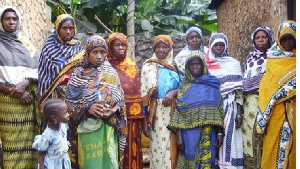 Swahili women dressed in the Kanga cloth. The KANGA is a rectangle of pure cotton cloth with designs
Swahili women dressed in the Kanga cloth. The KANGA is a rectangle of pure cotton cloth with designs
Swahili is the most spoken language in Africa, with over 140 million speakers. Also known as Kiswahili, the language is a Bantu language believed to have originated from other languages, specifically languages not native to Africa such as Arabic and Portuguese, following historical East African interactions with speakers of those languages.
It is the lingua franca of the African Great Lakes region and other parts of eastern and south-eastern Africa, including Uganda, Rwanda, Tanzania, Kenya, Burundi, Mozambique, and the Democratic Republic of the Congo (DRC).
Currently, Swahili is a national language of four countries, namely Tanzania, Uganda, Kenya, and the DRC. Shikomor, an official language in Comoros and spoken in Mayotte (Shimaore), is also related to Swahili.
Swahili, unlike other African languages, is not tonal, making it very easy to learn. It is also written in the Latin alphabet.
Here are six other facts about Swahili you ought to know.
Different dialects of Swahili
Swahili, like many African languages, has dialects but interestingly some Swahili some dialects are so varied that other Swahili speakers cannot discern even though they may be in the same country.
Unique linguistic character in Uganda
Swahili is an official language in Uganda but outside the capital Kampala, the language is hardly ever spoken as it carries dreadful sentiments for the people.
In Uganda, Swahili is associated with the totalitarian regime of Idi Amin as he forced Swahili to be the country’s official language, hence its rejection by many Ugandans.
Swahili operates on its own time
In most cultures, the clock, also the day, starts at midnight but not in Swahili. Their day starts at 6 or 7 am and this has been explained as a consequence of the equatorial placement of the countries that speak the language.
Basically, the time is measured from sunrise to sunset. This geographic phenomenon happens at the same time in all countries where Swahili is spoken in Africa.
Interestingly, Ethiopians often use the Swahili clock although it is not a Swahili-speaking country.
It’s easy to read
We know Swahili is easy to learn because it is not a tonal language. However, it is also easy to read as words are pronounced as they are written, just like in Latin.
Swahili is relatively not an ancient language
The earliest piece of written Swahili documents dates to 1711. They were letters written in the Kilwa region. These letters were written to the Portuguese people of Mozambique and other local allies. To date, the remains of the documents are preserved in the Historical Archive of Goa in India.
Full of idioms and proverbs
Swahili is famous for its idioms and proverbs that take the form of Mathali. Methali is a play on words, puns and lyrical rhyming and a very dominant feature of the Swahili language. Local rappers and musicians often employ methali in their music.
Example: Wapiganapo tembo wawili ziumiazo nyasi
Literal translation: When two elephants fight it’s the grass that gets hurt
Meaning: When the rich and powerful contend with each other, it is the weak and powerless who pay the price.